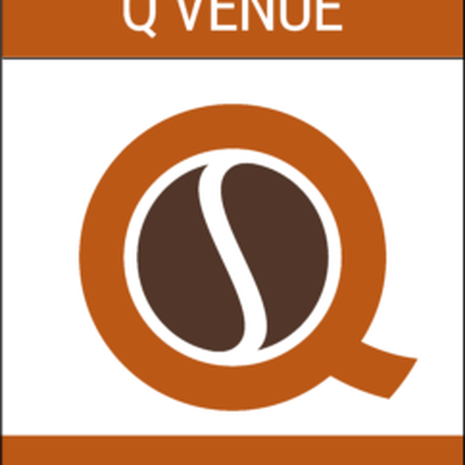Coffee Quality Institute’s Q VENUE PROGRAM
Associations
This product has options
Specifications
Seller Information
Similar products
What is a Q Venue?
Coffee Quality Institute’s mission, to improve the quality of coffee and the lives of people who produce it, is achieved through our education programs and training initiatives. The Q Venue Program creates a global, verified network of quality facilities for cupping, sensory and processing education designed to meet the specific instructional needs of all CQI courses. CQI Q Venues can be used in many ways; from instructors hosting courses, to development project trainings, and as a lab for coffee quality assessment. CQI will work with you to assess which Q Venue certification is the right fit for your needs.
CQI provides three types of certification for Q Venues: Q Venue, Q Venue Processing and Q Venue Professional.
What are the benefits of becoming a Q Venue?
Q Venue certification provides a verified space so that instructors and students recognize the facility as safe, accessible, and hygienic while also operating in accordance with industry standards and protocols. The infrastructure of Q Venues meets the needs of our market with specific professional equipment, supplies, and environment. CQI requires venues to obtain Q Venue approval and certification to host CQI courses.
Benefits include the ability to host CQI courses, the right to use the Q Venue Program logo, official certificate issued by CQI, promotion of certified Q Venues on our global website and to our instructors, and international recognition.

Coffee Quality Institute
The Coffee Quality Institute is a key implementing partner with Winrock International on the USAID VC-RD project in Myanmar. CQI’s contributions include technical support to improve coffee production and processing, cupper training, association and organizational development and market linkages. This includes a focus on enabling smallholder communities to pick, sort, and process coffees to ensure quality and specialty coffee standards, tracking systems, financial literacy, and other key capacity building considerations. During this program, Myanmar has made impressive strides to shift from a producer of low grade commodity coffee to high value specialty coffees sold in the global marketplace. Shan smallholder communities and the Mandalay Coffee Growers (MCG) are quickly becoming well known for their natural processed and washed coffees. The Myanmar Coffee Association is a key player supporting international marketing efforts and increasing domestic consumption; MCG is a lead processor and exporter for the country. The local roasting business community is also getting involved. As of 2016, Myanmar has five Licensed Q Graders. The practice of cupping coffee and a common language of quality (the Q) is now integrated throughout the value chain. Interest from green buyers in this origin is substantial, and buyers can now find trained cuppers to work with. CQI is pleased to have private partners, most notably Atlas Coffee Importers, import the first containers of specialty coffee to the U.S.. The export of specialty grade coffees is expected to increase annually beyond the life of this project, with Myanmar’s specialty coffee reputation already well established.
Product categories:
Supporters
Countries to which the seller delivers his products:
Abkhazia
Afghanistan
Aland Islands
Albania
Algeria
Andorra
Angola
Anguilla
Argentina
Armenia
Aruba
Australia
Austria
Azerbaijan
Bahamas
Bahrain
Bangladesh
Barbados
Belarus
Belgium
Belize
Benin
Bhutan
Bolivia
Bosnia & Herzegovina
Botswana
Brazil
Brunei Darussalam
Bulgaria
Burundi
Cambodia
Cameroon
Canada
Chad
Chile
China
Colombia
Costa Rica
Cote d'Ivoire
Croatia
Cuba
Cyprus
Czech Republic
Denmark
Dominica
Dominican Republic
Timor, East
Ecuador
Egypt
Eritrea
Estonia
Ethiopia
Fiji
Finland
France
Gabon
Haiti
Gambia
Georgia
Germany
Ghana
Gibraltar
Greece
Greenland
Grenada
Guadeloupe
Guam
Guatemala
Guinea
Guinea-Bissau
Honduras
Hong Kong
Hungary
Iceland
India
Indonesia
Iran
Iraq
Ireland
Israel
Italy
Jamaica
Japan
Jordan
Kazakhstan
Kenya
Kiribati
Korea
Korea, D.P.R.
Kuwait
Kyrgyzstan
Lao P.D.R.
Latvia
Lebanon
Lesotho
Liberia
Libyan Arab Jamahiriya
Liechtenstein
Lithuania
Luxembourg
Macedonia
Madagascar
Malawi
Malaysia
Maldives
Mali
Malta
Mauritania
Mauritius
Mexico
Micronesia
Moldova
Monaco
Mongolia
Montenegro
Morocco
Mozambique
Myanmar
Namibia
Nepal
Netherlands
New Zealand
Nicaragua
Niger
Nigeria
Norway
Oman
Pakistan
Panama
Paraguay
Peru
Philippines
Poland
Portugal
Qatar
Romania
Russia
Rwanda
San Marino
Saudi Arabia
Senegal
Serbia
Singapore
Slovakia
Slovenia
Somalia
South Africa
Spain
Sri Lanka
Sudan
Sweden
Switzerland
Syrian Arab Republic
Tajikistan
Tanzania
Thailand
Togo
Tunisia
Turkey
Turkmenistan
Uganda
Ukraine
United Arab Emirates
United Kingdom
Uruguay
USA
Uzbekistan
Vatican City
Venezuela
Viet Nam
Western Sahara
Yemen
Zambia
Zimbabwe





